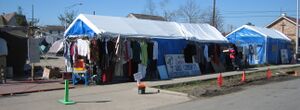Common Ground Collective

From Peter Gelderloos, Anarchy Works [1]:
Earlier this decade, in one of the most individualistic and competitive societies in human history, state authority collapsed for a time in one city. Yet in this period of catastrophe, with hundreds of people dying and resources necessary for survival sorely limited, strangers came together to assist one another in a spirit of mutual aid. The city in question is New Orleans, after Hurricane Katrina struck in 2005. Initially, the corporate media spread racist stories of savagery committed by the mostly black survivors, and police and national guard troops performing heroic rescues while fighting off roving bands of looters. It was later admitted that these stories were false. In fact, the vast majority of rescues were carried out not by police and professionals, but by common New Orleans residents, often in defiance of the orders of authorities.[2] The police, meanwhile, were murdering people who were salvaging drinking water, diapers, and other living supplies from abandoned grocery stores, supplies that would otherwise have been ultimately thrown away because contamination from floodwaters had made them unsalable.
New Orleans is not atypical: everyone can learn cooperative behaviors when they have the need or desire to do so. Sociological studies have found that in nearly all natural disasters, cooperation and solidarity among people increase, and it is common people, not governments, who voluntarily do most of the work carrying out rescues and protecting one another throughout the crisis.[3]
...After Hurricane Katrina devastated New Orleans, activist street medics joined a former Black Panther in setting up the Common Ground clinic in one of the neediest neighborhoods. They were soon assisted by hundreds of anarchists and other volunteers from across the country, mostly without experience. Funded by donations and run by volunteers, the Common Ground clinic provided treatment to tens of thousands of people. The failure of the government’s “Emergency Management” experts during the crisis is widely recognized. But Common Ground was so well organized it also out-performed the Red Cross, despite the latter having a great deal more experience and resources.[4] In the process, they popularized the concept of mutual aid and made plain the failure of the government. At the time of this writing Common Ground has 40 full-time organizers and is pursuing health in a much broader sense, also making community gardens and fighting for housing rights so that those evicted by the storm will not be prevented from coming home by the gentrification plans of the government. They have helped gut and rebuild many houses in the poorest neighborhoods, which authorities wanted to bulldoze in order to win more living space for rich white people.
- ↑ Anarchy Works
- ↑ Amy Goodman, “Louisiana Official: Federal Gov’t Abandoned New Orleans,” Democracy Now, September 7, 2005. Fox News, CNN, and The New York Times all falsely reported murders and roving gangs of rapists in the Superdome, where refugees gathered during the storm. (Aaron Kinney, “Hurricane Horror Stories,” Salon.com)
- ↑ Jesse Walker (“Nightmare in New Orleans: Do disasters destroy social cooperation?” Reason Online, September 7, 2005) cites the studies of sociologist E.L. Quarantelli, who has found that “After the cataclysm, social bonds will strengthen, volunteerism will explode, violence will be rare...”
- ↑ Neille Ilel, “A Healthy Dose of Anarchy: After Katrina, nontraditional, decentralized relief steps in where big government and big charity failed,” Reason Magazine, December 2006.